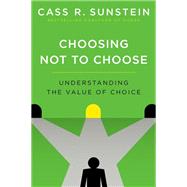Our ability to make choices is fundamental to our sense of ourselves as human beings, and essential to the political values of freedom-protecting nations. Whom we love; where we work; how we spend our time; what we buy; such choices define us in the eyes of ourselves and others, and much blood and ink has been spilt to establish and protect our rights to make them freely.
Choice can also be a burden. Our cognitive capacity to research and make the best decisions is limited, so every active choice comes at a cost. In modern life the requirement to make active choices can often be overwhelming. So, across broad areas of our lives, from health plans to energy suppliers, many of us choose not to choose. By following our default options, we save ourselves the costs of making active choices. By setting those options, governments and corporations dictate the outcomes for when we decide by default. This is among the most significant ways in which they effect social change, yet we are just beginning to understand the power and impact of default rules. Many central questions remain unanswered: When should governments set such defaults, and when should they insist on active choices? How should such defaults be made? What makes some defaults successful while others fail?
Cass R. Sunstein has long been at the forefront of developing public policy and regulation to use government power to encourage people to make better decisions. In this major new book, Choosing Not to Choose, he presents his most complete argument yet for how we should understand the value of choice, and when and how we should enable people to choose not to choose.
The onset of big data gives corporations and governments the power to make ever more sophisticated decisions on our behalf, defaulting us to buy the goods we predictably want, or vote for the parties and policies we predictably support. As consumers we are starting to embrace the benefits this can bring. But should we? What will be the long-term effects of limiting our active choices on our agency? And can such personalized defaults be imported from the marketplace to politics and the law? Confronting the challenging future of data-driven decision-making, Sunstein presents a manifesto for how personalized defaults should be used to enhance, rather than restrict, our freedom and well-being.








